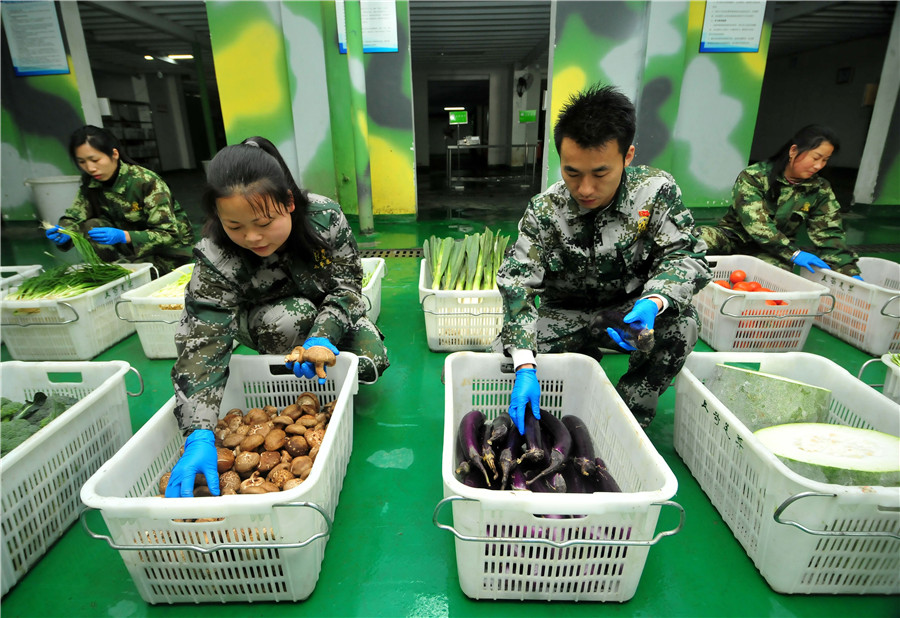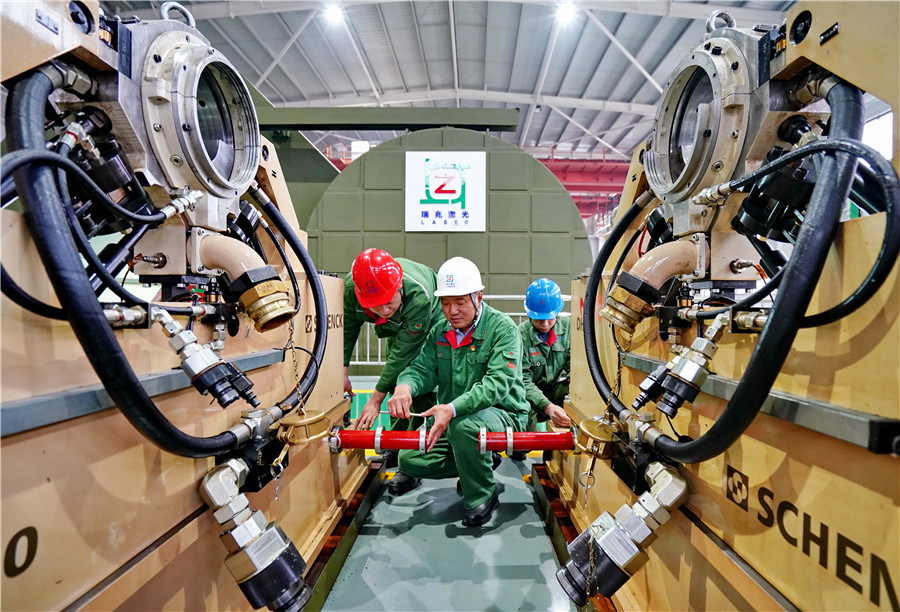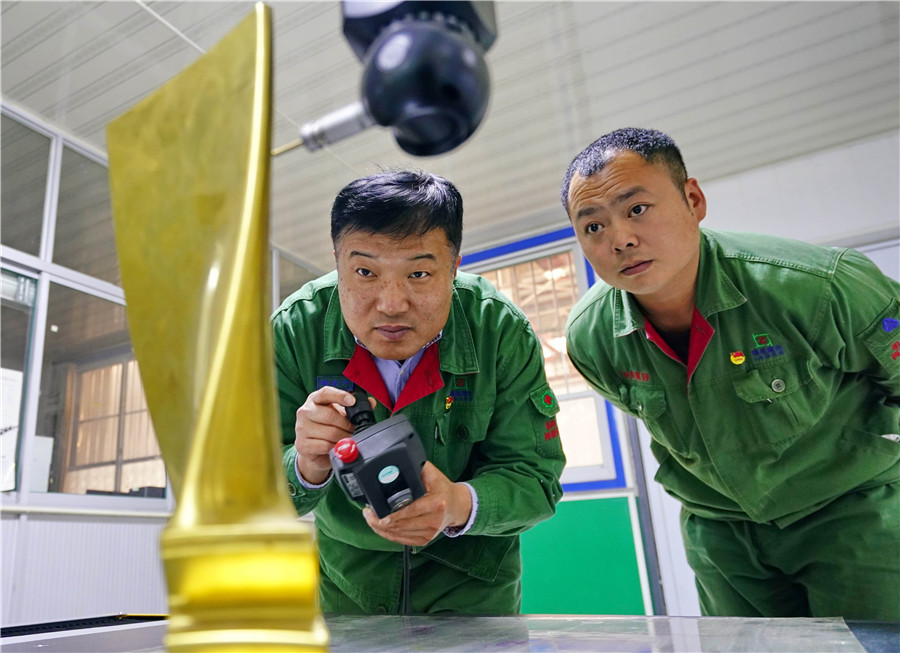
Chen Kunyuan (second from right) and some of his employees sort vegetables before delivering them to customers in Nanchang, Jiangxi province. (Photos: Xinhua)
The internet offers many opportunities for former military personnel. Yang Zekun reports.
Chen Kunyuan used to exercise at 5:30 am every day during the eight years he spent in the People's Armed Police in Nanchang in the eastern province of Jiangxi.
However, after leaving the force and starting a vegetable delivery business in Nanchang, he missed out on a lot of sleep for the first three years because the vegetables had to be sent out before 7 am.
Since the People's Republic of China was founded in 1949, more than 57 million military personnel have re-entered civilian life, and the number rises by hundreds of thousands every year, according to the Ministry of Veterans Affairs. Last year, the number was about 530,000.
All have been properly resettled or have found jobs on their own. Many have even started their own businesses, proving that veterans have plenty of advantages and opportunities in the competitive internet era.
Success story
Lacking the professional skills of some of his veteran peers, Chen struggled to find a career after he left the armed police in 2010, so he worked as a security guard and driver. Now, though, he is chairman of Jiangxi Bingge Food Delivery Ltd, a successful e-commerce company that provides fresh food on demand.
Last year, the Publicity Department of the Communist Party of China and the Ministry of Veterans Affairs honored Chen by giving him the "Most Beautiful Veteran" award for his contribution to veterans' employment and startups.
After resigning his driver's job, Chen searched for opportunities to found his own business. In late 2010, he started his vegetable delivery business with 50,000 yuan ($7,380) he borrowed from friends and family after the failure of a tea retailing venture in which he lost all of his savings.
"Fresh food deliveries had just started in China. It is a labor-intensive job without any skill requirements, so I thought it might be an opportunity for me," he said.
He rented a 50-square-meter storefront in a large wholesale market in Nanchang and started his new business with two other veterans. He often spent entire days looking for clients and suppliers of low-price vegetables.
Most of his clients used mobile phones to place orders. However, some were unable to speak Putonghua-standard Mandarin-which caused many problems. To alleviate the problem, he transferred his business to QQ, an online platform.
"Like WeChat nowadays, QQ was popular among my clients back then. I asked them to use QQ rather than mobile phones when placing orders," he said, adding that the company now has online management systems which deal with order placement, deliveries, accounting and billing.

Veteran Shu Chunyan and his wife Li Peiyuan harvest chrysanthemums in Jiande, Zhejiang province. Shu invested 1 million yuan ($147,608) in the local chrysanthemum industry in 2015.
Opportunity knocks
Opportunity arrived unexpectedly for Chen Honggang, a veteran from Wuchang, Heilongjiang province, Northeast China, who left the People's Liberation Army Navy in 2004 after serving for five years.
In 2010, he established an online rice retailing business, having spent four years working in several cities selling components for electronic devices, and two years caring for his sick parents.
One day when he was surfing the net he discovered that people were selling rice online.
"I thought, 'Why don't I sell rice?' After all, Wuchang rice is famous nationwide," he said. He quit his job and returned to Wuchang to set up his online store.
"Opportunities often appear unexpectedly, and you need to be alert to them. I think all our veterans should have high levels of awareness," he said.
Chen Kunyuan's lack of experience resulted in occasional confusion.
"I could only talk about vegetables when other entrepreneurs were discussing business models and management," he said, adding that he quickly realized he needed to learn many things after founding his company.
Because his education ended at high school, he still attends business and technical lectures at a college to improve his knowledge of management and marketing. Most of his classmates have bachelor's or master's degrees.
He won many honors in the People's Armed Police, which he believed would ensure he got a good job when he left the force. Instead, the gap between civilian and forces life hit him hard, leaving him puzzled and disturbed when he worked as a security guard and driver.
"I wondered what I could do to change my life, and I wanted to change the stereotypical jobs for veterans, such as security guards and drivers," he said.
He firmly believes in the power of education: "To continue learning and never take shortcuts is the quickest route to success. I hope other veterans can change their way of thinking as soon as possible and learn as much as they can."
Despite his background as a maintenance technician in the PLA Navy, Chen Honggang struggled to find work because different companies required different skills. He worked for companies that made electronic components and home appliances for four years, but realized that he would have to acquire new skills in his free time.
When he left the armed forces, he knew little about the internet because service personnel are not allowed to use the web. Moreover, as a member of the PLA Navy, he was often away at sea for months at a time, sometimes even a year, he said.
He was curious the first time he saw people selling and buying goods on an online store, so he bought some items.
"It was all quite new for me, so I wondered if maybe I could also become an online retailer," he said. Though he tried everything he could think of to learn how to start an online store, it was tough because many of the concepts were too abstract for him to understand.
He now rents about 0.13 square kilometers of land in Wuchang, where an employee grows the rice he sells. Chen Honggang's next goal is to learn more about agricultural science to improve the quality of his crops.

Veteran Han Hongsheng (center) and technicians check equipment at his mechanical and electrical maintenance company in Qianxi, Hebei province.
Education
Veteran Chen Lei, founder of 81-Lianpin, an online employment platform for ex-forces personnel, echoed Chen Kunyuan's point about further education. Self-study is always the focus when she shares her experiences with veterans.
While serving in the PLA for five years, she gained a bachelor's degree in arts from Fujian Normal University. In 2002, she began a marketing career in Taiyuan, capital of Shanxi province before working as deputy general manager of a company in Beijing in 2004. She was admitted to Peking University's Guanghua School of Management in 2015.
"A soldier's training is mainly about mental toughness. As long as we are willing to learn and work hard, nothing is too difficult. I think an unwillingness to accept mediocrity is the motivation behind everyone's progress," she said.
The soldier's spirit
For Chen Honggang, starting a new business is a battle, so people must overcome difficulties or fail. He recalled an experience during his service days when he sprained an ankle during a training exercise, but he ignored the pain and completed the course.
Though his family gave him lots of help, he still had to shoulder most of the workload in the company's initial phase. In addition to collecting rice from local farmers, he had to monitor his computer screen until midnight every day to accept orders.
"It was a hard time, but I would not quit-there is no such word in a soldier's dictionary," he said.
The first three years of his business life were hard for Chen Kunyuan.
He spent every day looking for customers, before spending the hours from 10 pm until 7 am calculating the types of vegetable he would require and the quantities he would need, along with purchasing, manually logging and delivering them.
Unable to afford a van, he rode an electric tricycle or a bicycle to make deliveries.
"The skin of my hands and face often peeled in the hot summer and cracked in freezing winter," he said. "Sometimes I asked myself why I didn't just find an easier job, especially when customers refused to pay or I couldn't pay my employees."
Despite occasional doubts, he persevered and became successful thanks to the soldier's code of "Never give up".
"Tasks in the army were much harder than running a business, and sometimes they were life-threatening. Also, I knew I could change my life as long as I persisted," he said.

Han (left) tests the blade of a steam turbine in his company's workshop.
Challenges, opportunities
A lack of clear goals and proper projects are common problems for many former forces personnel. Chen Lei often asks veterans who want to launch a business what they want to do and what they are capable of doing.
"The requirements for starting a business in the internet era may be low, but we must always consider the fierce competition," she said, adding that the internet offers many opportunities for employment and startups.
According to her platform's data, more than 14 percent of internet-related companies wanted to hire veterans last year, while former forces personnel accounted for about 20 percent of applicants for the jobs.
Chen Bin, manager of the Veterans' Pioneer Park in Putuo district, Zhoushan city, Zhejiang province, said many veterans are willing to start their own businesses and there are many opportunities to do so, but every project must be planned well.
The park, which opened in December 2017 and is open to veterans nationwide, offers support in terms of startup loans and premises. It has 55 startup teams, with half of them focused on internet businesses.
Chen Bin stressed that veterans need to identify effective business partners and acquire different skills in the initial stages.
Pioneer parks for veterans have sprung up across China recently.
For example, since 2016, parks have opened in Hebei province, the Inner Mongolia autonomous region and Fujian province.
Entrepreneurs have also helped veterans to found businesses. Chen Kunyuan's company has provided special funds and founded an incubator park for veterans. So far, 30 former forces personnel have benefited.
Government support
Veterans are an important talent pool, and all government and military authorities promote and ensure their welfare when they leave the armed forces. Authorities also offer support and services for veterans looking for work or hoping to start their own businesses.
In his speech at the 19th National Congress of the Communist Party of China in 2017, Xi Jinping, general secretary of the CPC Central Committee, stressed the task of making "soldier" a respected profession in society.
In July, 12 government and military authorities published a document to help veterans find civilian jobs or start their own businesses.
The document-drafted by the Ministry of Veterans Affairs, which was established in April-specified the duties and responsibilities of each government and military department involved in finding employment for former forces personnel.
In addition, it highlighted guidance and services for those looking to start their own business, including organizing training, providing premises and offering financial and tax incentives.
A draft law on veterans' welfare has been sent to central and provincial governments and the military for consultation. It will be opened to public comment soon, the ministry said.
One of the ministry's main tasks this year is to strengthen education and training for veterans and offer them more support to make them more competitive in the job market.
Like many entrepreneurs, Chen Kunyuan built his business from scratch, and the Shanghai Equity Exchange-listed company had turnover of 500 million yuan in 2017.
Every week, the company arranges for more than 30 veterans to attend startup training, teaches them how to use the internet and answers their queries.
The 34-year-old's vision is clear: he wants to use the internet to train 100 veterans to become startup pioneers and help 300,000 former forces personnel or their families to find jobs or start businesses within the next 10 years.


